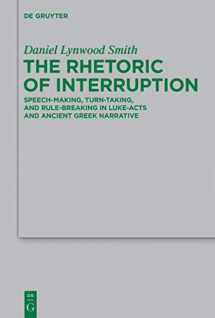
The Rhetoric of Interruption: Speech-Making, Turn-Taking, and Rule-Breaking in Luke-Acts and Ancient Greek Narrative (Beihefte zur Zeitschrift für die neutestamentliche Wissenschaft, 193)
ISBN-13:
9783110296426
ISBN-10:
311029642X
Edition:
1
Author:
Daniel Lynwood Smith
Publication date:
2012
Publisher:
Walter de Gruyter
Format:
Hardcover
351 pages
FREE US shipping
Book details
ISBN-13:
9783110296426
ISBN-10:
311029642X
Edition:
1
Author:
Daniel Lynwood Smith
Publication date:
2012
Publisher:
Walter de Gruyter
Format:
Hardcover
351 pages
Summary
The Rhetoric of Interruption: Speech-Making, Turn-Taking, and Rule-Breaking in Luke-Acts and Ancient Greek Narrative (Beihefte zur Zeitschrift für die neutestamentliche Wissenschaft, 193) (ISBN-13: 9783110296426 and ISBN-10: 311029642X), written by authors
Daniel Lynwood Smith, was published by Walter de Gruyter in 2012.
With an overall rating of 4.3 stars, it's a notable title among other
books. You can easily purchase or rent The Rhetoric of Interruption: Speech-Making, Turn-Taking, and Rule-Breaking in Luke-Acts and Ancient Greek Narrative (Beihefte zur Zeitschrift für die neutestamentliche Wissenschaft, 193) (Hardcover) from BooksRun,
along with many other new and used
books
and textbooks.
And, if you're looking to sell your copy, our current buyback offer is $0.57.
Description
Why are so many speakers interrupted in Luke and in Acts? For nearly a century, scholars have noted the presence of interrupted speech in the Acts of the Apostles, but explanations of its function have been limited and often contradictory. A more effective approach involves grounding the analysis of Luke-Acts within a larger understanding of how interruption functions in a wide variety of literary settings. An extensive survey of ancient Greek narratives (epics, histories, and novels) reveals the forms, frequency, and functions of interruption in Greek authors who lived and wrote between the eighth-century B.C.E. and the second-century C.E.This comparative study suggests that the frequent interruptions of Jesus and his followers in Luke 4:28; Acts 4:1; 7:54-57; 13:48; etc., are designed both to highlight the pivotal closing words of the discourses and to draw attention to the ways in which the early Christian gospel was received. In the end, the interrupted discourses are best understood not as historical accidents, but as rhetorical exclamation points intended to highlight key elements of the early Christian message and their varied reception by Jews and Gentiles.


We would LOVE it if you could help us and other readers by reviewing the book
Book review

Congratulations! We have received your book review.
{user}
{createdAt}
by {truncated_author}


